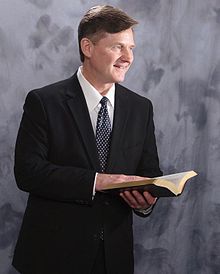By Dr. James F. Linzey

The Gospels end with the account of Jesus’ death and resurrection. The book of Acts starts with the beginnings of the New Testament Church and its growth under the ministry of the apostles and disciples. The disciples had not been ready for Jesus’ death and resurrection. Jesus had told them about it in specific ways, but they had not understood the events nor the significance of the events.
Now another huge event was about to take place—the coming of the Holy Spirit. Jesus had told them about this event too, and He wanted to be absolutely sure they were as prepared as they could be. The disciples would need to understand and cooperate for this experience to be all it should be, so Jesus went over His own teaching again and again. Jesus referred to John the Baptist’s statement about the baptism with the Holy Spirit, which Jesus said would now take place in a short time.
The disciples faced a great challenge. They were to be Jesus Christ’s witnesses. But how were they to do that? They had so many inadequacies and fears. The coming of the Holy Spirit was to fill the gap between their inadequacies and the job they had been given to do. Christ’s physical absence would be a tremendous void in their lives, but the coming of the Holy Spirit was to fill that void and also provide power for the disciples to be the witnesses for Christ they needed to be.
Sometimes it seems we face the same kind of challenge. The whole world needs to be evangelized—needs to hear the good news of Jesus and His provision for all. Yet we are so inadequate to do such a huge job. There are so many obstacles to overcome. Consequently, we also need the Holy Spirit—we need Him to fill the void left by the physical absence of Jesus, but we also need Him to provide us with the power we need to spread the gospel of Jesus to the world around us. As we desire the Holy Spirit to come and empower us, we will profit more fully if we know why the Holy Spirit came.
Why did the Holy Spirit come?
- The Holy Spirit came to enable us to think God’s thoughts. Isaiah tells us that God’s thoughts are higher than our thoughts (Isa. 55:9). God and man think on different levels. Paul confirms this concept in First Corinthians when he says, “the man without the Spirit does not accept the things that come from the Spirit of God, for they are foolishness to him, and he cannot understand them” (I Cor. 2:14). The different conversations Jesus had with His disciples demonstrate the point clearly. As Jesus told the disciples about the coming baptism in the Holy Spirit (Acts 1:5, 6), they did not understand what He meant and simply changed the subject. The disciples didn’t ask things like, “Lord what do you mean?” Or “explain what we are to do.” Instead, they wanted to know whether Jesus would restore the kingdom to Israel. The disciples’ focus was wrong—they were thinking of reigning in Jerusalem, but Christ was planning for them to be witnesses to the ends of the earth. They were thinking of glory on earth, and Christ was thinking of their suffering. They were thinking of themselves, but Jesus was thinking of a world of lost people. The Holy Spirit must come because our natural thinking is self-centered. The Kingdom of God requires self-giving. We think of ourselves; God thinks of others. So something must take place that will bring man’s thoughts into line with God’s thoughts. The Holy Spirit came to accomplish this. The Holy Spirit reveals the thoughts of Jesus to us (John 16:14).
- The Holy Spirit came to enable us to share God’s emotions. Just as by ourselves we cannot think God’s thoughts, so by ourselves we cannot feel as God feels. One concept we associate with God is Love. Love, for God, does not grow out of circumstances as it might for human beings. Instead, Love is founded in His very nature. God is love. Basically, people love themselves, and they love others who contribute to their needs. God loved us when we were rebels against Him. God does not need us in the way we need our friends. God loves mankind with pure love, not for what He can receive from people, but for mankind’s own sake.
It is not in people to yearn over lost souls that they don’t even know. It is not human nature to sacrifice strength and time, to cry and pray for hours over the lost. Only God’s Spirit can put that love in our hearts. Paul explains that “God has poured out his love into our hearts by the Holy Spirit, whom he has given us” (Rom. 5:5). So the Holy Spirit comes to break through our mental and emotional barriers and cause us to feel as God feels by loving others as God loves them.
- The Holy Spirit has come to enable us to pray God’s prayers—or to enable us to pray in God’s strength for the things God wants. We face the barrier of human limitation—we don’t know how to pray or what to pray for that will be the will of God. So our limitations are multiple. We not only don’t know what to ask for, but we don’t know how to present ourselves before God. The Spirit helps us by guiding our prayer life—asking what the Father wills to be asked. The Holy Spirit also gives us access to the Father (Eph. 2:18). There is no way we can force our way into God’s presence. The Holy Spirit must help us come before the Father; we have no access on our own. The language of the Holy Spirit—the language He gives us when we are baptized with the Holy Spirit—helps us in our prayer. The apostle Paul said that when he prayed in a spiritual language (an unknown tongue), his spirit was praying rather than his mind. When our spirits pray, the Holy Spirit can give further guidance in our prayers. What a blessed privilege to be able to pray in the Holy Spirit! When we pray in the Holy Spirit, we enter into the Holiest of Holies with God, into a living partnership with God in intercession. As a result, God can achieve His divine will in us and in those we pray for.
- The Holy Spirit comes to enable us to do God’s work. God announced His method even in Old Testament times: “Not by might, nor by power, but by my Spirit, says the Lord Almighty” (Zech. 4:6). That means we cannot depend on numbers, nor on human resources available, nor on our own abilities, or even on our own determination of purpose. We must depend on the Spirit of God to do the work. God has bypassed the wisdom of this world. The Church’s mission is too great to be left to human wisdom. On the Day of Pentecost when God filled the waiting disciples with His Spirit, God converted a weak and inadequate minority into a mighty spiritual force. And He has not stopped working that way. God is planning for us, for the Church of today, for individuals and for the world as a whole, in ways we cannot even imagine. There is no reason to give up, to say the power is not for us. God has always led His people to victory in the face of overwhelming odds. He can do it again. He is looking for a people whom He can fill with His Spirit, a people who will listen to His voice and will learn to pray in the Holy Spirit. With such yielded instruments as that, He will accomplish His eternal purpose.
What does the Holy Spirit do for believers? He enables them to do the will of God. The Holy Spirit furnishes the believer with actual virtues and practical holiness. The Holy Spirit banishes all our unbelief by filling us with Himself. The Holy Spirit restores the human spirit to its original and highest fellowship with the Creator. The Holy Spirit brings assurance of the Father’s love for us. The Holy Spirit brings some of the Divine nature into the nature of man, thus making the natural man disappear from our actions and our lives. The Holy Spirit makes our bodies into a temple, a place fit for the Lord God to dwell. We become a place of worship.
Dr. James F. Linzey is a retired army chaplain and current president of the Military Bible Association. He is also the chief editor and chairman of the Committee on Bible Translation for the Modern English Version of the Bible (MEV).




Well done
Dave
Comments are closed.